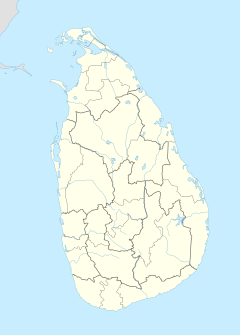Blue Water Hotel is a 5-star boutique hotel in Wadduwa, Sri Lanka. It is notable for being Geoffrey Bawa’s last hotel project and the last project he supervised on site before succumbing to illness.[1]
| Blue Water Hotel | |
|---|---|
 | |
| General information | |
| Location | Wadduwa, Sri Lanka |
| Coordinates | 6°40′40″N 79°55′14″E / 6.67778°N 79.92056°E |
| Opening | 1998 |
| Owner | Union Resorts |
| Management | Union Resorts |
| Technical details | |
| Floor count | 3 |
| Design and construction | |
| Architect(s) | Geoffrey Bawa |
| Developer | Ajit Wijesekera |
| Other information | |
| Number of rooms | 100 |
| Number of suites | 5 |
| Number of restaurants | 3 |
| Website | |
| Official site | |
Geography
editThe hotel is situated in Wadduwa, a small coastal town located (27 km (17 mi) south of Colombo. The site originally was a coconut plantation, situated between the beach and the coastal railway line.[2]
History
editThe hotel was commissioned by Ajit Wijesekera of Union Apparel (a garment manufacturer) in 1994, the design of which was a collaboration between Geoffrey Bawa and Milroy Perera.[3] Work on the project commenced in 1996 and was completed in 1998.[4][5] The hotel suffered damage to sixteen ground floor rooms as a result of the 2004 Boxing Day tsunami[6] but there were no deaths. The hotel was initially managed by Jetwing Hotels until 2008 when it was taken over by Union Resorts, who renovated it and added a reception room/banquet room.[7]
Architecture
editThe hotel was one of Geoffrey Bawa's last major projects,[8] which Patrick Kunkel of ArchDaily believes "represents a slightly more minimalistic approach to his architectural design informed by his earlier work."[9] Australian architect, Ceridwen Owen, describes it as "exhibiting a carefully orchestrated sequence of spaces between land and ocean."[10]
For the building design Bawa returned to a simple rest house layout, which he first used in 1967 for the Serendib Hotel, but reinterpreted on a grand scale with expansive courtyards and limitless vistas. The main entrance is a lofty porch, with an enclosing wall which screens the hotel from the adjacent railway line. The entrance doors open out to a long axial arcade running across a large garden court, past the hotel lobby and out through the coconut grove towards the sea and the horizon. David Robson in his book, Geoffrey Bawa: The Complete Works, states "the sequence of spaces is formal and controlled; the materials highly polished, light in tone and muted in colour and the architecture restrained but monumental."[11] The hotel is an example of Bawa’s minimalist style, use of space, lengthy corridors, open views, water, terracotta tiles and frangipani trees.
Facilities
editThe hotel has 100 rooms, two restaurants, three bars, an outdoor pool, and a spa.
References
edit- ^ "Bawa - Solo Contextual Modernism". Geoffrey Bawa Trust. Retrieved 7 November 2016.
- ^ "Architect's Archives - Blue Water Hotel - Colombo, Sri Lanka". ArchNet. Retrieved 7 November 2016.
- ^ Weliyange, Dimantha (July 2011). "The Architect - Journal of the Sri Lankan Institute of Architects". A Journey in Architecture. Archived from the original on 7 November 2016. Retrieved 7 November 2016.
- ^ "The Work of Geoffrey Bawa". Geoffrey Bawa Trust. Archived from the original on 16 August 2016. Retrieved 7 November 2016.
- ^ Silva, Roy (13 January 2004). "The Blue Water gets 5-star status". The Island. Retrieved 7 November 2016.
- ^ Cox, Christopher R. "tsunami Impact". Travel+Leisure. Retrieved 7 November 2016.
- ^ Pradeepa, Ganga (14 November 2008). "Blue Water Hotel Wadduwa beautiful setting". Daily News. Retrieved 7 November 2016.
- ^ Jansz, Beverley (20 August 2007). "The Blue Water". Daily News. Retrieved 7 November 2016.
- ^ Kunkel, Patrick (23 July 2016). "Spotlight: Geoffrey Bawa". ArchDaily. Retrieved 7 November 2016.
- ^ Owen, Ceridwen (March 2008). "International Journal of Architectural Research". Architecture between the Culture-Nature Dualism: A Case Study of Geoffrey Bawa's Kandalama Hotel. 2 (1): 45.
- ^ Robson, David (2002). Geoffrey Bawa: The Complete Works. London: Thames & Hudson. pp. 212–215. ISBN 9780500341872.
External links
edit- Official site
- Robson, David (2004). Geoffrey Bawa: Genius of the Place: An Architect of Sri Lanka. Deutsches Architekturmuseum. ISBN 9780500341872.
